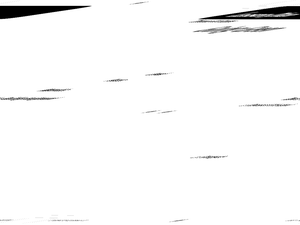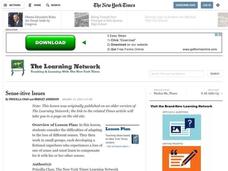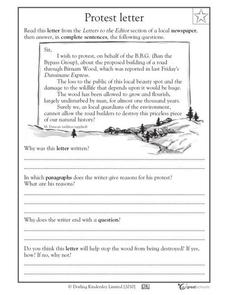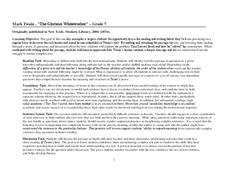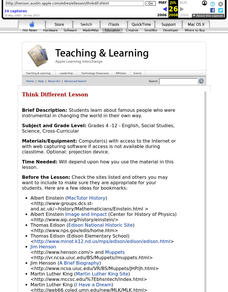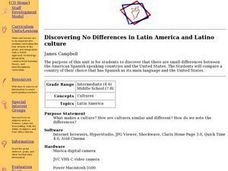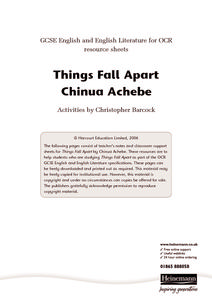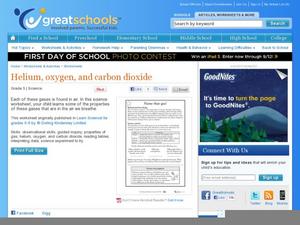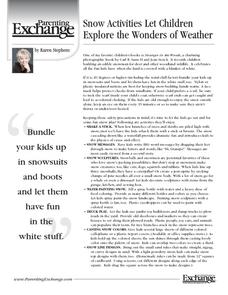Curated OER
The Pirates of the Caribbean
Third graders participate in a demonstration lesson that shows a map of the Caribbean Islands. They examine a natural resource that each island is known for. Next, they listen to a read aloud of Gail Gibbons, "Pirates: Robbers of the...
Curated OER
Pumpkins, Pumpkins, Pumpkins
Pupils identify and interpret the lifecycle and parts of the pumpkin. Students utitlize interactive ways to discover this process. Pupils create a big book of their own by researching further information about pumpkins and what makes a...
Curated OER
Going Green
Students create an action plan to learn how to preserve natural resources for future generations. In this environmental conservation lesson, students research the topic of preserving the natural environment and write a definition for...
Curated OER
Severe Weather
Fifth graders identify the causes and effects of several different kinds of
severe weather phenomenon. They read an excerpt from John Muir's book The Mountains of California and research one of the following severe
weather phenomena...
Curated OER
Sense-itive Issues
Students consider the difficulties of adapting to the loss of different senses. They work in small groups, each developing a fictional superhero who experiences a loss of one of sense and must compensate for it with his or her other senses.
Curated OER
Following the Leaders
Examine the historic election of Pope Benedict XVI and reflect on the challenges he faces as the new leader of the Catholic Church. This New York Times lesson investigates how other world leaders are chosen in different forms of...
Poetry Society
Simile and Metaphor
Young poets use word cards to prompt a metaphor poem comparing to very dissimilar items.
Curated OER
Recurring Nightmares
Does history really repeat itself? Encourage your middle and high schoolers to answer this age-old question by reading the attached articles on the Cuban Missile Crisis of 1962 and the Iraq Crisis of 2002. How similar or different are...
Curated OER
Fighting for Control
Engage your class in a class discussion examining and defend different sides of an argument about whether the Environmental Protection Agency should have the legal authority to regulate carbon dioxide emissions. They will have to...
Curated OER
Red Dirt Groundbreakers
Discover Oklahoma's first farmers. Read about 14 different agriculture workers and their contribution to Oklahoma's farming. After reading, have your class complete several activities such as researching an agriculturist, writing a...
Curated OER
Protest Letter
What a fantastic resource to guide youngsters in persuasive letter writing. They read a brief letter to the editor and answer question about the author's purpose, word choice, and structure. Next, scholars draft their own letter by...
Curated OER
The Glorious Whitewasher
Young readers can be exposed to the literary works of Mark Twain as they interact with challenging text and gain experience by reading the complex passages of chapter two "The Glorious Whitewasher" from his famous book, The Adventures of...
Facing History and Ourselves
How Journalists Minimize Bias
Class members are challenged to write a neutral news story about the events they observe in a short video. After sharing their stories in groups and discussing the different perceptions, the class concludes with a video of journalists...
Curated OER
People Who "Think Different"
Students conduct Internet research on one famous person to explore his/her important contributions to society.
Curated OER
Discovering No Differences in Latin America and Latino Culture
Students explore the differences between American Spanish speaking countries and the United States. Students explore the history and culture of Spanish speaking countries. They examine Latino influences. Students create a presentation...
Curated OER
Alike and Different
Second graders listen to a book about how farms feed the world. They discuss elements of rural life. They listen to a story about the suburbs and discuss elements specific to a suburban community. They listen to a story about city...
Curated OER
Evaluating Information Sources Worksheet
Your class is getting ready for its first big research project. While they know how to use the Internet, do they know how to find academic information? Do they know how to find credible sources? Give them this packet and bring them to...
Curated OER
Literature Circles
Literature circles let kids interact with each other and hear different perspectives. explore literature circles. Group your class into small reading groups, and then assign each class member a specific role to keep them focused. After...
Curated OER
Are Beds Made of Balsa Wood?
Here is an interesting resource which describes different kinds of wood and their uses. There is a table with six different types of furniture wood listed, and the number of worm holes found in each one. Based on the information in the...
Curated OER
Things Fall Apart Chinua Achebe
Here’s a 19-page Things Fall Apart teacher resource packet from the UK that includes background information on Chinua Achebe, the culture of the Ibo people before and after colonization, and activities designed to prepare learners for...
Curated OER
Name That Gas!
Young scientists discover that air is a mixture of different gases - mainly nitrogen and oxygen. The properties of some of the other gases found in oxygen are listed in a table, then learners must decide which one of those gases is...
Parenting Exchange
Snow Activities Let Children Explore the Wonders of Weather
Just because there's snow on the ground, it doesn't mean you can't go out and play. Take full advantage of the wonderful winter weather with this collection of fun snow day activities.
Curated OER
Verb Tenses
Discover how to use proper verb tenses with context clues. Five sentences help first graders decide if they should use -ed or -ing to end simple verbs. Each sentence provides context clues to indicate the time. Use the resource in...
Chicago Botanic Garden
Faces of Climate Change
Sometimes, the best solution to a problem can be found by walking in someone else's shoes. Here, scholars use character cards to take on the roles of people around the world. They determine how their character's life affects our...




